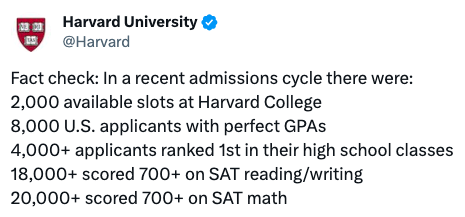Ayda Kulacoglu (10) | STAFF REPORTER
In the pursuit of higher education, the landscape of university applications has undergone a profound transformation, leaving behind the genuine pursuit of knowledge and passion. High school students, caught in the frenzy of impressing admission committees, are increasingly participating in and creating impressive-looking organizations, teams, and clubs, claiming to put time and effort into them all while juggling school, jobs, and all their other extracurriculars. Are young people capable of such an intense workload without being burnt out, or are they just adding impressive titles to pad their university applications? If so, are students really to blame?
This trend reflects a shift in the motivation behind seeking higher education. Instead of choosing a path driven by genuine passion and intellectual curiosity, students are increasingly focused on trying to make their applications stand out in a sea of competitive and like-minded peers, a field that gets more competitive every year. Although this aspect of entering post-secondary education has been around for a long time, it is only recently becoming apparent how this competition is transitioning from being helpful to hindering. To a certain extent, healthy competition in reaching higher education has been perceived as positive – motivating students to reach their potential. However, in recent years, it seems to have evolved into an uphill battle on an endless road.
Last year, Harvard University– one of the most prestigious and competitive establishments in the world– tweeted that in a recent admissions cycle there were 2,000 available spots at the university, whilst there were 8,000 U.S. applicants with perfect grade averages, more than 4,000 applicants that were first in their high school classes, and thousands of applicants with almost perfect standardized test scores. This paints a picture of how cutthroat top-tier universities have become and the pressure on high school students to stand out beyond their grades.

It is not uncommon to see students setting up clubs and organizations that vanish the moment they hit the university campus, or even burn out because of all their commitments at such a young age. This rigorous standard that students are expected to uphold and excel in causes them to lose authenticity in the quest for higher education, affecting both individual students and society as a whole.
When the focus shifts from a love for learning to crafting an impressive story for university applications, the true meaning of education gets watered down. This trend also raises a broader societal worry; if the next generation learns to prioritize looks over substance, what does that mean for the future? This problem has been evident in many aspects of modern society since the rise of social media and society’s craze over celebrities. For instance, a recent study published in BMC Psychology remarks that “excessive behaviors such as celebrity worshiping can possibly impair cognitive functioning, presumably due to the increased focus and energy invested in this behavior that becomes dominant in the individual’s life.” This solidifies the negative effects of prioritizing shallow values over the passion for change and improvement. The actions of establishments that produce future innovators and leaders are bound to affect all of society, for better or for worse.
Hence, the lack of authenticity in high school students’ pursuit of university admission is both troubling and harmful to students. When the application process leans more towards creating a “wow factor” than a genuine love for knowledge, it not only undermines the educational journey for individual students but also raises concerns about the kind of society we are shaping.



